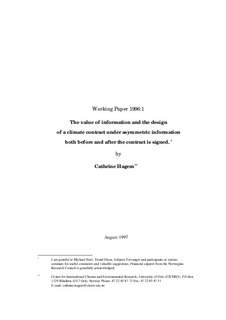| dc.contributor.author | Hagem, Cathrine | nb_NO |
| dc.date.accessioned | 2014-03-17T14:31:07Z | |
| dc.date.available | 2014-03-17T14:31:07Z | |
| dc.date.issued | 1996 | nb_NO |
| dc.identifier.issn | 0504-452X | nb_NO |
| dc.identifier.uri | http://hdl.handle.net/11250/192178 | |
| dc.description.abstract | The starting point of this paper is that a group of countries cooperate to reduce global emissions of CO2. In order to reduce the cost of achieving a target for global emissions reduction, they offer a non-cooperating country a financial transfer for implementing abatement policies. The non-cooperating country has access to private information both before and after the contract is signed. We analyze the design of an abatement contract, and evaluate under what circumstances and at what time it is valuable for the cooperating countries to acquire more information about the non-cooperating country's abatement cost, although this is costly. | nb_NO |
| dc.language.iso | eng | nb_NO |
| dc.publisher | CICERO Center for International Climate and Environmental Research - Oslo | nb_NO |
| dc.relation.ispartof | CICERO Working Paper | nb_NO |
| dc.relation.ispartofseries | CICERO Working Paper;1996:01 | nb_NO |
| dc.title | The value of information and the design of a climate contract under asymmetric information both before and after the contract is signed | nb_NO |
| dc.type | Working paper | nb_NO |
| dc.source.pagenumber | | nb_NO |
